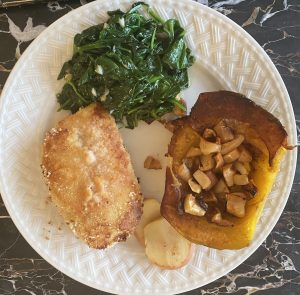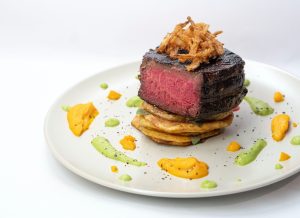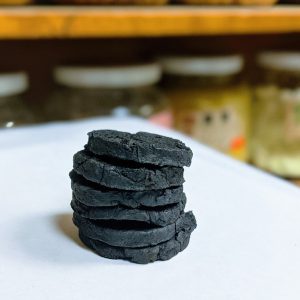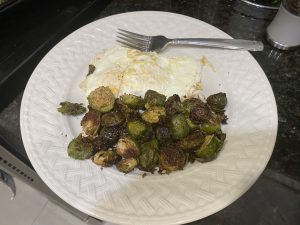Recipes
How to Design Meals like Medicinal Formulas
 If food is medicine then creating each meal should be a bit like writing your own herbal formula. Whenever possible, it should be as agreeable as possible with our unique physiology, though this is admittedly challenging when cooking for a family where everyone has different body types. Nevertheless, one part of each meal should complement the other parts, either through synergistic benefit or offsetting its potentially detrimental qualities.
If food is medicine then creating each meal should be a bit like writing your own herbal formula. Whenever possible, it should be as agreeable as possible with our unique physiology, though this is admittedly challenging when cooking for a family where everyone has different body types. Nevertheless, one part of each meal should complement the other parts, either through synergistic benefit or offsetting its potentially detrimental qualities.
As a longstanding, traditional example, any time we get Thai or Mexican food, it is served with cucumber or radishes, respectively, which are there to mitigate the side effects of the spice.
Most foods are good, but almost all of them have “side effects.” Red meat nourishes the body’s blood, yin, and qi, but if it were an herb it would be a bit warm and damp. Too much red meat and/or red meat that is not harmonized by the remainder of the meal can create damp heat, or inflammation in the stomach and intestines. Then again too little red meat can cause a deficiency of blood, yin, and qi. Ideally red meat (and pork) would be consumed alongside steamed vegetables, then followed by hot green tea, either after the meal or the following morning (green tea at other times and/or for vegetarians is thought to have a bit too cooling, or vasoconstrictive effect on the microbiome—for them black teas are preferable).
Carbohydrates are settling for both the stomach and the mind—probably why they give us such immediately pleasure—but they are obviously stickier foods, “damper” foods, which are more difficult to digest. For this reason whenever possible, it is best to eat them warm and cooked, and alongside more acrid spices in the meal, such as basil, rosemary, ginger, garlic, or onion. While I am Jewish and from New York, and love a great tuna on a bagel, there is a remarkable difference in the physiological response to cold tuna on bread versus cooked pasta with garlic and oil, maybe vegetables and cannelini beans. Yum!
Salads. Oh boy, do westerners love salad. Frankly, if you tend to any digestive problems whatsoever, raw foods should be avoided as much as possible, but if you must:
Consume salad more in summer—less in winter—and always alongside some cooked protein and/or ginger tea. The acridity of the ginger should help to warm the stomach to digest the raw foods. The protein should provide warmth, plus some much needed calories, or “qi and yin.”
Cooked vegetables, allergies notwithstanding, are probably the only perfect food that wholly lack side effects, which is probably why they are also the one food that nearly every paradigm of medicine agrees upon. If you don’t consume cooked vegetables daily you are on a dangerous path, in my opinion. They are nearly always harmless and beneficial… yet still ultimately inadequate, as we can only imagine the metabolic fatigue and inevitable illnesses to come were someone to consume exclusively vegetables.
Food is a gentle medicinal. It will neither heal nor destroy us quickly on its own, however it will always do one or the other over time. I’ve seen firsthand, in myself, loved ones, and patients eradicate chronic symptoms by pursuing a more Eastern diet, though it took many months—in my case years! People should not get discouraged by eating well for a particular interim and not feeling dramatically better. Instead, pay attention to whether you feel worse (always a possibility), meanwhile recognizing that without internal medicine, diet alone may take a long time to cure disease. It is up to us to continue to better understand the nature of each food, so that we can wisely design the perfect “herbal formula” three times a day until the end of time.
Pictured above is an imperfect, but still great meal: Breaded chicken cutlet, sauteed spinach, and roasted acorn squash with roasted apples, cinnamon, and maple syrup. What is “imperfect” about it? First, fruit should be consumed at least 15 minutes apart from other foods so as to avoid creating its notoriously mucus-like congestion in the microbiome. Also, “natural” or not, let’s be honest: maple syrup is sugar; and chicken is healthier without breadcrumbs. On the other hand, breadcrumbs make up a very small amount of the meal, the apples are at least cooked, hence easier to digest, and the leafy greens with garlic should help to optimally process the meat and sugars.
How Much Animal Protein Should I/We/U Eat?

I got some great feedback from last week’s newsletter, not the least of which in the form of an inquiry and idea for elaboration on what is a “mindful” amount of animal protein for one to consume. Obviously, this is a subject of great debate—as are most dietary recommendations—and one Chinese medicine has strong opinions on.
Ironically, it was “The China Study” (2005) that prompted even greater popularity for vegetarianism, in spite of my understanding its conclusion was predicated on the assumption that if less is good, then none must be great. Traditional Chinese Medicine does not agree.
It would be impossible to know exactly how much animal protein is advisable for any one individual, but relatively easy to offer some general guidelines:
- Eat only wild fish, grass-fed or grass-finished meats, sans hormones or antibiotics. I recommend Whole Foods, Vital Choice, or Butcher Box.
- Eat more animal protein in winter and less in summer—approximately once a day in winter (in addition to eggs is fine, since eggs are light and easily digestible in the absence of any specific sensitivity) and 2-4 times a week in summer.
- Women should eat more red meat on their menses.
- Women should eat more red meat before, during, and after pregnancy.
- Elderly people need more animal protein than younger people.
- Everyone needs more animal protein after surgery, or after something like a marathon—basically any physical trauma.
- Animal protein should make up the smallest portion of food on your plate. In no way does this mean it should not appear on your plate, nor that its appearance is that of an allowable indulgence. Just that if each meal could be looked at as an herbal formula, the most beneficial dosage of steak would be smaller than that of broccoli.
- It is a kind gesture to say a quick prayer and thank the animal before consumption.
- People with a great deal of systemic “damp heat” should eat less animal protein than those with systemic “cold” and “blood deficient” constitutions. The challenge of course lies in that damp heat can dry out our body fluids and create blood deficiency, which causes us to require more meat. Also cold, over time, can create damp heat in the typical manifestation of inflammation as result of weakness.
How do you know who you are? It’s tough.
“Cold people” tend to have lesser appetites, more digestive complaints, and more frequent bowel movements. They’re rarely thirsty and rarely sweat, but they tend to sleep great.
“Damp heat people” tend to huge appetites, iron stomachs, and less frequent bowel movements, which doesn’t seem to bother them at all. They’re more likely ravenously thirsty and sleep is a great challenge.
Obviously, there are exceptions to these rules, but mostly as a result of one pathology lingering chronically for long enough to complicate the pattern by engendering its opposite. This is what makes real medicine so challenging. In school we learn case studies as if people are one or the other—either warm or cold-bodied—then we get into practice and quickly realize if only it were so simple. People are complex. So are our bodies, which means so should be its fuel sources.
I love my vegan friends, I respect vegetarianism for ethical reasons, but per usual, I believe that Chinese Medicine’s more moderate and discerning perspective on diet is most logical.
Red Meat and Foxglove Root as Medicine

In my last weekend roundtable of case discussions with my group in Beijing, my teacher reminded us of the importance of sometimes inquiring how patients feel while digesting red meat. Whether they feel good, bloated, constipated, or otherwise, can inform us of the strength of the microbiome.
Red meat, like all foods in Chinese Medicine, is medicinal, but like any medicinal it is not perfect. Although there is no better food for building and nourishing the blood and body fluids, plus warming the overall gut, red meat is obviously a heavy material, more difficult to digest than most foods, and therefore should be dosed and prescribed mindfully.
This reminded me precisely of how we think of “shu di huang,” a Chinese herbal medicinal that is better known in the west as foxglove root. Foxglove root is one of the most important herbs in our pharmacopeia for building and nourishing blood—especially when the lack of blood has led to internal heat in the body.
The problem is if you look at raw foxglove root it looks like a stale old chocolate brownie. It is dense, heavy, and sticky, invaluable to certain patient patterns, but also difficult to digest; we are continuously reminded to not prescribe unless and until patients’ microbiome functionality is fully, or close to fully restored. It’s a rather simple connection: If someone feels bloated or distended after eating red meat they cannot yet handle foxglove root. If we make the mistake of prescribing it, they’ll likely come back complaining of worse digestive issues and no improvement of symptoms. We always must first rectify the gut before rebuilding blood. This is Chinese herbal medicine in a nutshell—or a stale brownie if you will.
We are now entering the time of year where red meat is most advisable, utilizing its sweet warming properties to balance the bitter cold of winter, as well as its fatty lubrication to counteract the dryness most evidenced on our skin or chapped lips.
However, it is important to dose properly—also whenever possible to intelligently design the remainder of each “formula,” which is to say plate of food. Since something like salmon is relatively easy to digest it can be consumed alongside more carbs and/or potatoes. On the other hand, red meat is better harmonized by cooked greens and light vegetables to aid in its downward movement. Beer and white bread will obviously have the opposite effect.
By all means take the following Eastern recommendations with a grain of salt (or pinch of sea salt atop your filet mignon this holiday season):
- Ideally, red meat should make up the smallest portion of food on your plate. When it doesn’t it’s important the following day to drink plenty of mint, barley, and/or ginger tea to help with its processing and digestion.
- Red meat might be consumed about once a week in summer months and three times a week in winter months.
- Red meat should be consumed more by people over the age of 60, women on their menses, and people with relatively “cold constitutions,” that tend more to anemia, hypotension, hypothyroid, and almost “hypo” anything.”
- People with warmer body types with tendencies to “hyper” conditions, or dealing with serious hemorrhoids or intestinal inflammation should mostly avoid red meat until said symptoms are resolved.
- Red meat can be consumed with reckless abandon by any woman less than six months post-partum and almost any woman trying to get pregnant. If it bothers your stomach I would advise starting with very tiny portions and gradually increasing the dose, as unlike foxglove root, red meat should strengthen the microbiome enough to tolerate more of it.
If you are a meat-eater and have never been to Quality Meats in Manhattan I’d highly recommend! My father always preferred The Palm II on 2nd Avenue, but I believe he was guilty of nostalgic attachment, as it was located a few blocks from his office of several decades.
Chinese Medicine Breakfast Ideas

I’m not sure what the time or place was that berthed the maxim, Breakfast is the most important meal, but they were obviously more attuned with human biology than our own. In Chinese Medicine’s circadian clock, 7am-9am is considered the “time of the stomach.” The prior, 5-7am, corresponds to the large intestine, which makes it the ideal and most common time for bowel movements; before that, 3-5am, to the lungs, which is why many people with chronic or acute coughs are disrupted by them in the middle of the night.
While this may all sound like esoteric medical theory, it aligns perfectly with modern biomedical understanding: The reason 7-9am is the time of the stomach is because it is when metabolism is strongest—when our bodies are most sensitive to the insulin hormone, whose job it is to break down glucose from food and transform it into nutrients.
We say “stomach qi.” They say insulin secretion. Same thing. Of course, when people lack a morning appetite or experience a weaker metabolism in the morning we consider this to be pathological, diagnostically informative. Since for most of us 8am is at least 12 hours since our last meal this should not sound far-fetched. Chinese Medicine believes when we do not adequately exercise our microbiome in the morning we weaken it—a similar use it or lose it view as to the muscles, tendons, and ligaments that are ultimately nourished by the gut as well.
Intermittent fasting can have many health benefits when done responsibly, but if one intends to do it intelligently, without potentially robbing Peter to pay Paul in the long term, you would skip or have an early dinner, instead of neglecting science by skipping breakfast. I understand the potential social repercussions of this, for which I recommend compromise: Have dinner or later dinners on social nights, while on quiet nights, if it works for you keep to your fasting window.
For those who claim to not have time for breakfast, I am skeptical. As most of you know, for the past year I’ve been still running my own practice while co-parenting a 14-month old. Recently, as she has rapidly grown in physical mobility and emotional attachment, I’ve been forced to cook with one hand and arm in the morning. I’ve learned to crack and cook eggs all with one (messy) hand, and inadvertently multi-tasked into giving my left bicep a tremendous daily workout. Even on my earlier days in the office we never skip breakfast.
One of my favorite and easiest recipes are as shown above, eggs over easy with ANY roasted vegetables. As long as you can find the five minutes to wash and chop the veggies, you can then throw them on the pan, add salt, pepper, garlic powder, and flaxseed, and cook for 20 minutes, during which time you can get ready for the day (or sit cross-legged on the floor and read children’s books). When they are a few minutes from ready return to the kitchen for your one-minute, one-handed eggs. Once plated I like to add a good quality olive-oil atop the vegetables, a) to give them moisture, b) for olive oil’s health benefits. Viola! Breakfast!
In Chinese Medicine eggs are considered one of the healthiest foods in the world. They even appear in a couple of our herbal formulas that are designed to clear pathological heat from the body by nourishing our healthy fluids and blood. Between my wife, daughter, and I, we consume 3 dozen/week, and I can’t imagine where we’d be if we didn’t. Bon Appetit!
For a FREE INITIAL CONSULTATION on how Chinese Medicine might be able to help you, CLICK HERE.


